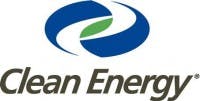
Like the clogged arteries symptomatic of heart disease, the nation’s highway and rail transport systems are being clogged by an unhealthy (environmentally) and costly fuel source, diesel and gasoline.
The prescription
Clean Energy Fuels Corp (NASDAQ:CLNE) , like a heart surgeon in an operating room, is working to carefully insert a stent into the clogged vein of commercial transport. Clean Energy Fuels sells natural gas as an alternative fuel for both over-the-road trucking and for railroads. In addition to sourcing both compressed natural gas (CNG) and liquefied natural gas (LNG), the company also sells the equipment, engineering, and assists in arranging financing for the infrastructure needed to operate this technology.
Most significantly, Clean Energy is developing “America’s Natural Gas Highway,” a strategically designed program of LNG refilling stations located along interstates across the US. The vision is to create a coast-to-coast network of natural gas infrastructure to drive demand for natural gas fueled vehicles in commercial trucking.
The news is awash in stories about the modern day boom towns in North Dakota as people from across the country race to cash in on the black gold of the Bakken fields. The US is well on its way to energy independence as new fracking technologies open up previously inaccessible fields of gas and oil. The Energy Information Administration calculates that 99% of domestic natural gas consumed in 2012 was supplied from fields in either the US or Canada. As a fuel source, natural gas is proving abundant, and domestic.
The challenge though, is updating the infrastructure in the US to take advantage of natural gas (versus the historical reliance on crude oil, gasoline, and diesel). And that is where Clean Energy Fuels Corp (NASDAQ:CLNE) Fuels differentiates itself from its competitors.
Take Chesapeake Energy (NYSE:CHK) as an example. Chesapeake, with a market capt of $13.8 billion, is a behemoth relative to the $1.24 billion Clean Energy. Chesapeake, despite ongoing distractions caused by mismanagement and activist investors, still produced $12.32 billion in trailing 12 month revenue, gross profit of $2.73 billion, and positive EBITDA of nearly $4.5 billion.
The key difference is that Chesapeake is a producer of natural gas. They are a commodity player who invests in the drilling, rather than the use of the product. This is a key distinction, and one that puts Clean Energy in a position for massive growth over the next 5 years.
A significant risk for Chesapeake is volatility in the commodity pricing for both petroleum and natural gas. The Chesapeake business model only works if the commodity prices are high enough to overcome the massive capital requirements to develop, prospect, drill, and extract the commodity. In the last few years, basic supply and demand have forced prices dramatically lower.

Clean Energy mitigates this risk by investing in the usage of the commodity. With little to no exposure in the drilling of the product, the company is largely unaffected by these price fluctuations. The business model is similar conceptually to a credit card processor. The processors simply collect a fee every time a buyer uses a credit card without shouldering any of the credit risk. They key for the credit card company, and for Clean Energy, is for the card (or natural gas) to be accepted and used as widely as possible.
The prognosis
The concept is catching on. Big companies such as Caterpillar Inc. (NYSE:CAT) and General Electric Company (NYSE:GE) are investing in the technology to operate their rail and truck fleets on LNG. GE has committed to providing Clean Energy Fuels Corp (NASDAQ:CLNE) with a $200 million credit facility, providing working capital for the continued development of the technologies, deepening their relationship, and increasing industry commitment to LNG as a viable alternative fuel.
At Dec. 31, 2012, Clean Energy operated or supplied 348 natural gas fueling stations in 32 states, Canada, and Peru. 70 of these stations are part of the “America’s Natural Gas Highway” network, with 50-70 additional stations planned for completion in 2013.
Clean Energy Fuels Corp (NASDAQ:CLNE) has a unique business model that differentiates it from its traditional competitors in the natural gas business. It has strong partnerships with world class companies that are invested in the success of fuel alternatives. Electric energy is making headlines in the consumer vehicle markets with the recent successes of Tesla Motors, but Clean Energy Fuels is clearly the leader in developing viable clean energy alternatives for commercial transport.
The article Open Heart Surgery for America’s Highways – Clean Energy Fuels (CLNE) has the prescription originally appeared on Fool.com and is written by Jay Jenkins.
Copyright © 1995 – 2013 The Motley Fool, LLC. All rights reserved. The Motley Fool has a disclosure policy.

